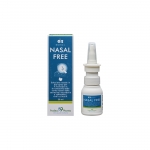Ours is a holistic approach that does not hinder the physiological processes of the body. It's an approach that encourages the restoration of balance, by combatting the causes of symptoms as efficiently as possible and ensuring fast relief.
Symptoms and relief
SELECT YOUR NEED
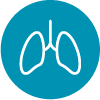
Respiratory system
THE RESPIRATORY SYSTEM
THE RESPIRATORY SYSTEM is a complex apparatus of areas and organs that spans multiple levels; the cilia cells, found in the airways from the nose to the terminal bronchioles, are covered with a thin layer of mucus that hydrates them and keeps them clean.
Viral and/or bacterial microbial infections can alter the mucociliary balance. These lead to irritation and inflammation, causing hypersecretion with increased mucus viscosity and the accumulation of mucus in various parts of the airways.
ISSUES:
UPPER AIRWAYS:
- COLDS
- OTITIS MEDIA
- SINUSITIS
- ADENOIDITIS
- TONSILLITIS
- PHARYNGITIS
- LARYNGITIS
LOWER AIRWAYS:
- TRACHEITIS
- BRONCHITIS
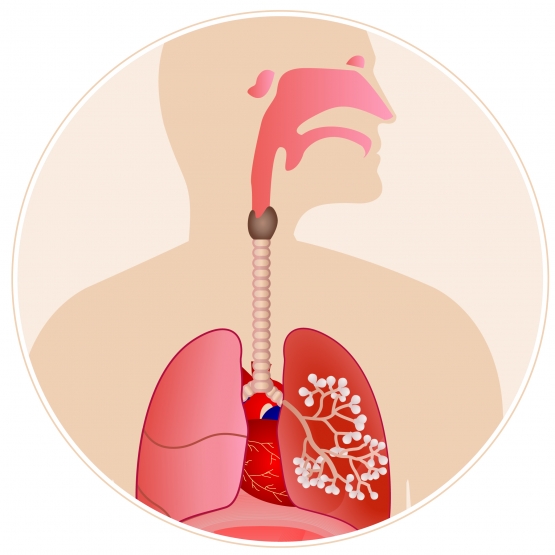
SYMPTOMS:

The nasal cavities form the inner part of the nose and are high and deep. At the front, they open into the external nose through the nostrils; at the back, they end in a vertical fissure at the side of the upper portion of the pharynx, above the soft palate and near the orifices of the Eustachian tubes leading to the tympanic cavity of the ear.
Both the nasal cavities and the nostrils are lined with mucosa, which produces mucus, while the nostrils are also lined with hard hairs, called vibrissae. Both the mucus and vibrissae prevent the passage of foreign substances, such as dust or tiny insects, which might otherwise enter the airways along with the inhaled air. As air passes through, the mucus dehydrates and tends to turn into solid mucus.
Another function of the nasal mucosa is to purify the air that is warmed by capillaries. In the region of the nose devoted to olfactory perception, the mucosa is very thick and dark due to the presence of a brown pigment. Olfactory receptors send stimuli to the brain via the olfactory nerve, which branches into the nasal cavities with many small fibers.Among the various disorders that can affect the nasal cavities, given the presence of mucosa and the delicacy of this particular type of tissue, nasal ulcers are not to be underestimated. The origin of the formation of such ulcers may differ depending on the particular case; mainly, they can be caused by "mechanical" stresses such as rubbing with fingers or objects (especially in children) or as a consequence of bacterial, viral or fungal ailments. In any case, a rubbing ulcer can later become infected and give rise to microbial issues.
BROAD-SPECTRUM ANTIMICROBIAL ACTION
GRAPEFRUIT SEED EXTRACT
- Effective against viruses and bacteria responsible for respiratory ailments: Haemophilus influenzae, Staphylococcus aureus, Influenza virus A2, etc.
- Selective, targeting pathogens and not affecting the physiological microflora

NARROW-LEAVED CONEFLOWER (ECHINACEA ANGUSTIFOLIA)
Activates phagocytosis and slows the spread of pathogens due to its rich phytocomplex capable of inhibiting hyaluronidase.
The alkylamides have anti-inflammatory properties.
EXPECTORANT AND SECRETION DISSOLVING ACTION
BRECKLAND THYME (THYMUS SERPYLLUM)
Balsamic, expectorant and phlegm-inhibiting action.
ELECAMPANE (INULA HELENIUM)
Alters bronchial secretions.
ANTISPASMODIC ACTION
SUNDEW (DROSERA ROTUNDIFOLIA)
Rich in naphthoquinones, it has a calming effect on coughs.
BALSAMIC ACTION
MOUNTAIN PINE (PINUS PUMILIO)
"Pumilio" Essential Oil is rich in volatile compounds, which are beneficial to the respiratory mucosa.
COMMON THYME (THYMUS VULGARIS)
Contains thymol, a phenolic terpene, highly concentrated (to 50%); it is also indicated for use in children.
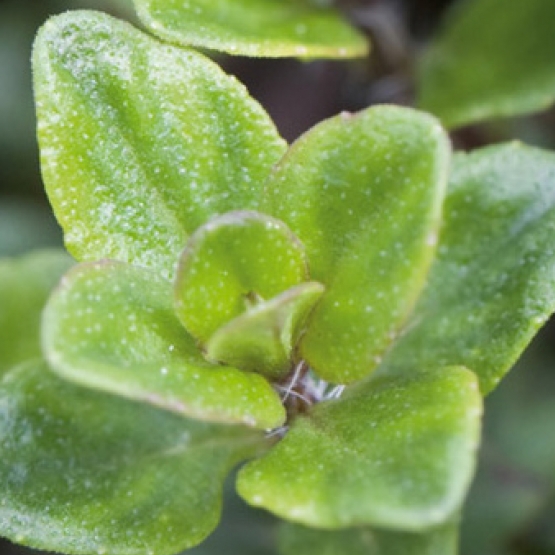
LIFESTYLE - NUTRITION - RESPIRATORY SYSTEM
The human body is almost always able to overcome the attacks from viruses, bacteria and fungi, as long as we keep it healthy and give it proper attention by ensuring it has all the elements it needs to function properly (vitamins, minerals, antioxidants, fats, etc.). One of the indispensable factors is making conscious choices about food and a willingness to adopt balanced behavior throughout the year, not only in situations of necessity when the symptoms of bronchitis, cold, flu, cough, sore throat, earache, etc. are already present. To strengthen the natural defenses, it is of fundamental importance to adopt a balanced diet which is also rich in fiber: this part of food that the digestive system cannot digest represents the main and preferred nourishment for the intestinal bacterial flora that helps us protect ourselves from external agents. Accordingly, we recommend whole grains, vegetables and fruits, both cooked and raw. These are valuable foods for their fiber content, but also for the supply of vitamins, minerals and antioxidants.
On the other hand, foods that weaken the immune system and the intestinal flora should be avoided:
- simple sugars and refined carbohydrates, especially sweets, candies, snacks, sugary drinks, refined grains (white pasta and bread, as well as all baked goods made from refined flour)
- trans-hydrogenated fats and excess saturated fats, especially fried foods, cured meats, processed meats, dairy products and red meat.
- high-calorie foods that are rich in unhealthy fats such as hydrogenated fats (lipids that undergo a transformation known as hydrogenation to be suitable for the needs of the food industry), which are responsible for worsening the inflammation
THE ADVANTAGES OF
- FRUITS AND VEGETABLES. By consuming fruits and vegetables on a daily basis, elements such as antioxidants, vitamins, minerals and fiber are supplied, which are useful in controlling and lessening the overall state of inflammation, thus helping the immune system to be ready and efficient when needed. IMPORTANT. It is essential to respect the seasonality of foods because fruits and vegetables from greenhouses, or imported from distant countries, rarely reach the quality of naturally ripened ones in terms of the content of vitamins, minerals and antioxidants. IMPORTANT: Cooking fruits and vegetables at high temperatures significantly reduces the concentration of vitamin C and all volatile vitamins.
- DRIED FRUIT. Nuts (especially pecans), pine nuts, almonds, cashews, etc. are valuable sources of zinc, a mineral which is essential for the body, fulfilling a number of biological roles, most importantly that of supporting the immune system. It is important to avoid zinc deficiency, which is quite common due to an unvaried diet rich in refined foods
- FERMENTED FOODS. Sauerkraut, vegetable yogurt with no added sugars, tempeh (a food derived from soybean fermentation), water kefir, etc. contain cultures of live bacteria, so-called probiotics, which contribute to the healthy intestinal flora and thus strengthen the immune system.

OTHER SUPPORTERS OF THE IMMUNE SYSTEM
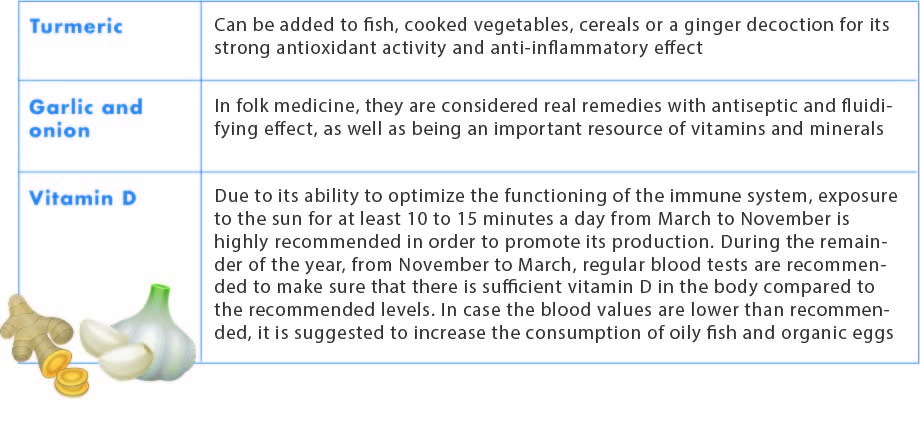
- consuming foods of organic and/or 0-km origin
- in accordance with the above advice, following a varied diet, favoring the consumption of fruits and vegetables, preferably in season, easily digestible proteins (small fresh fish, white meat, eggs), legumes, pumpkin seeds, sunflower, flax, chia, etc., walnuts, almonds, hazelnuts, etc.
- consuming cereals, preferably whole grain but not only, because in some cases fiber prevents the absorption of minerals and other nutrients, semi-wholegrain cereals and pseudocereals (quinoa, buckwheat, amaranth)
- preferring foods that are sources of omega-3 fatty acids, such as flax oil, hemp oil, oily fish (mackerel, sardines, sardines etc.), chia seeds, flax seeds, etc.
- staying adequately hydrated. Water requirements vary from individual to individual and change according to different lifestyles, type of activity and diet. An adult should generally drink 2 liters of water per day to maintain good health. Water is an essential element for the body because it regulates various biological functions. Therefore, it is important to maintain proper hydration, especially during the summer season, during sports activities and in all situations in which a lot of fluids are lost.
- avoiding abuse of gluten-containing foods, packaged foods and fried foods
- limiting sugar, sugary drinks, refined grains (white bread, white pasta, white rice, etc.)
- avoiding hydrogenated fats, limiting red meat, milk and its derivatives, and salt. When consuming them, prefer those of high quality
The notions and advice offered herein are for educational purposes only and cannot under any circumstances replace medical advice. For a complete diet, it is necessary to consult a nutritionist, who, after appropriate clinical and instrumental examination, will be able to identify the needs of the person concerned and put together a personalized diet plan.
